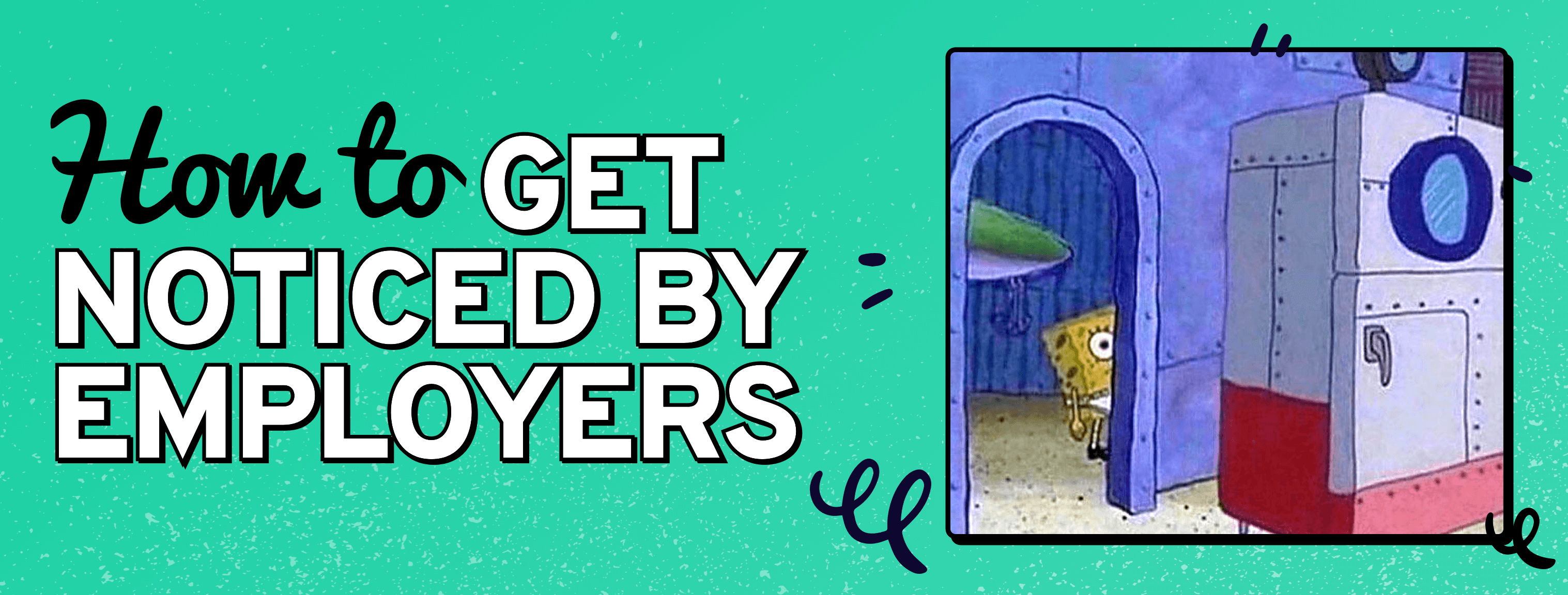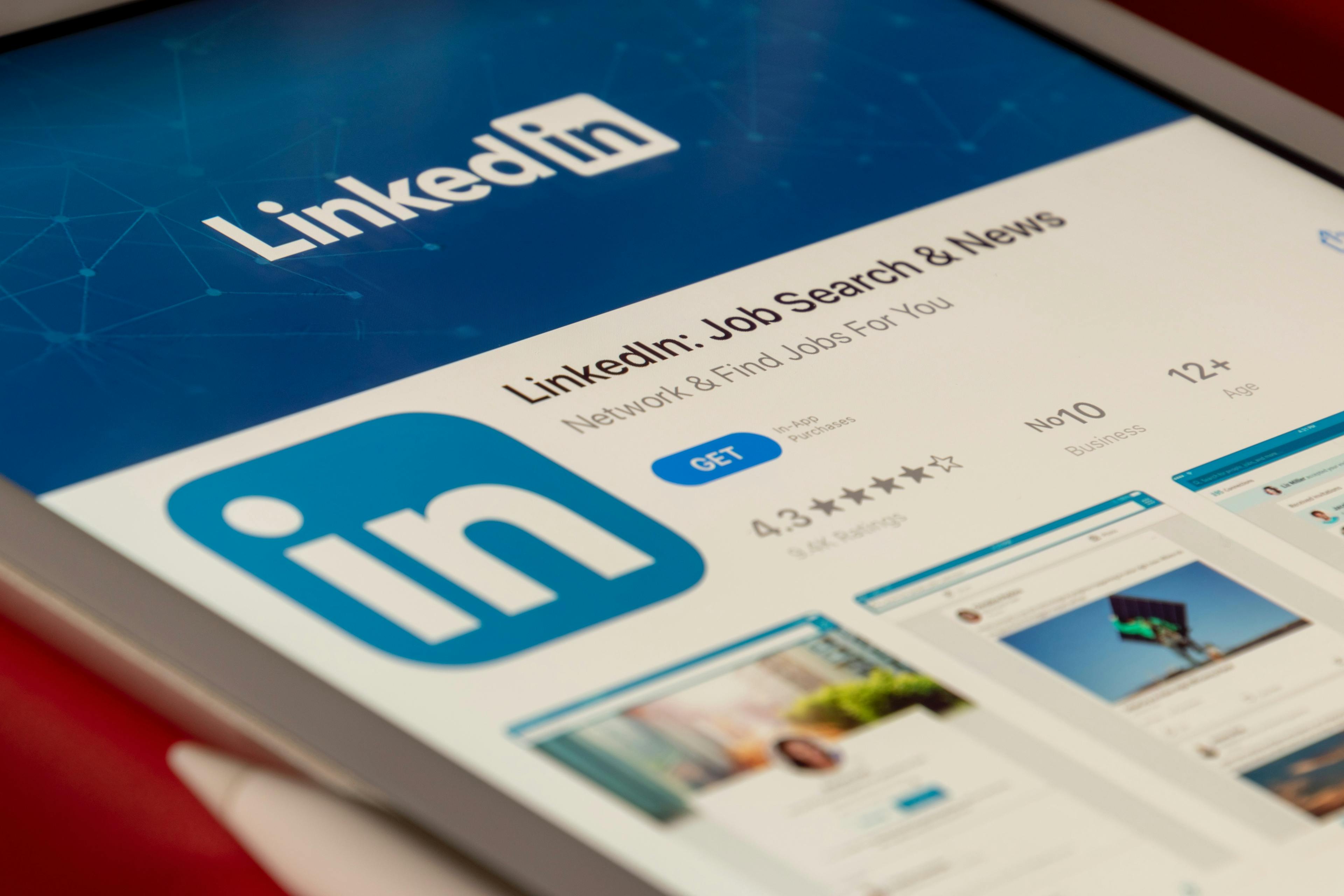How to get noticed by employers
13th May 2024

The process of looking for a new job can be daunting for lots of us. And when you know that many companies are receiving hundreds of CVs and cover letters for every single role they advertise, it’s easy to find yourself wondering how on earth you can stand out from the crowd.
Your experience, skills and qualifications may be perfect for the job; but you're still at risk of getting lost in the sea of applications that employers receive every day. In the age of tech, social media and AI, it’s more important than ever to utilise your strengths and establish a presence, so that your dream employer simply can’t help but notice you.
With this in mind, here are 10 top tips to level up your application - and improve the chances of finding your dream job.
1. Presentation is key 🔑
It sounds obvious, but you’d be surprised by the number of applications that miss the mark when it comes to presentation. Your CV and LinkedIn profile are an online extension of you, so it’s important to keep both of these elements up to date and looking sharp. Here are some key things to remember:
Correct spelling and use of grammar
We'd all like to think that the content of our application matters more than how well it's written: but, rightly or wrongly, poor spelling and grammar are one of the first things a recruiter or hiring manager will notice. This has never been more true, especially when technology now tends to highlight any mistakes with that red squiggly line of doom.
It's well worth taking an extra 10 minutes to check over your writing before you press 'submit'. If this isn’t something you feel confident with, you could ask someone you trust to proofread for you; or try out a tool like Grammarly to help you do it yourself.
Neat and consistent formatting
This is mostly applicable to your CV, but it’s important to maintain consistent formatting, such as using the same font and size, using paragraphs, and making sure your dates and job titles are formatted in the same way throughout. It’s also recommended that you convert your CV to a PDF file before you send it, to help avoid any formatting errors occurring on the recipient's end. There are lots of easy ways to do this, but Adobe has an easy drag-and-drop tool if you are feeling stuck.
Matching job titles and dates on your CV & LinkedIn profile
It doesn’t leave a very good impression if the job titles and work dates on your CV don’t match your LinkedIn profile. It's a surprisingly common mistake, and often leaves the recruiter asking questions and wondering about the truth. Do a quick spot-check before you send off your application to avoid any embarrassing questions.
Correct contact details
There's no point in spending your time and energy updating your CV, only to forget that you've still got your old phone number on there from the last time you were applying for jobs! Ensure that you have your full name, up-to-date telephone number and email address displayed at the top of your CV in a clear font.
2. Let your personality shine ⭐️
Sadly, many jobseekers fall into the trap of thinking that 'being professional' means not showing too much personality. This might have been true once upon a time, but nowadays, allowing your personality to shine through in your application can be the secret sauce that helps you stand out from the rest of the talent pool. Of course, you still want to maintain some degree of professionalism - but employers want to see who you really are, so don't be afraid to show them.
Is your personality a good fit for their existing culture? What will your traits and quirks bring to the business? Put simply: are you a nice person who is enjoyable to work with? Usually, you’d see this kind of information being discovered at a face-to-face interview, but don't be afraid to sprinkle it into your application if it feels relevant. Remember that recruiters and hiring managers are just people, and it's always refreshing for them to read an application that feels genuinely human after reading dozens that sound the same (ChatGPT, anyone?)
It’s truly wonderful when someone can make themselves shine on paper as well as in person. Be yourself. Don’t hold back. Because the more honest you are about yourself, the more likely you are to succeed with a company that is a true match for you.
3. Showcase your work with an online portfolio 🖼️
You don’t have to be creative to have an online portfolio; and it doesn't have to be a complicated task for you to set one up, either. It’s a really good idea to share any work you’re proud of, even if that just means having relevant examples prepared. Provide details of the creation process, show how you brought your work to life, and share the final results and any feedback received. People are naturally curious, and interviewers love it when a candidate is able to showcase their experience as well as just talk about it. It doesn’t need to be too complex, and it doesn’t require you to be too tech-savvy either.
Whether you build yourself a simple website with a tool like Squarespace, create a presentation deck, attach digital samples to your application or take physical copies along to an interview, you can be sure that you’ll be remembered and stand out as an individual who’s passionate about their work and getting the right results.
If you don’t feel that a portfolio is right for you, make sure you’re at least able to discuss strong examples of your experience and back up these achievements with key facts and figures. It’s a good idea to outline this information on your CV as well. For example, for those in a performance-based position, you might mention growth or sales figures alongside the role: “I grew sales from X to Y year on year” or “I increased email engagement from X% to Y%”.
4. Maintain an active presence on LinkedIn 💻
Like it or not, LinkedIn has consistently proven itself as a solid tool for professional networking and finding employment. And the platform makes it easy for your content to be seen and distributed amongst your network and beyond: all it takes is a like or a comment from a connection for your content to then be displayed to second and third-party networks. The more you share, the wider your reach. The wider your reach, the bigger your network. So when it then comes to job seeking, you’ll not only have a network of connections to help you with referrals and introductions, but prospective employers will also see that you have a presence; an active role within the community, and a clear desire to stay on top of industry news and trends.
Sharing original content is obviously a great way to maintain a presence online and show off your knowledge and creativity, but that doesn’t mean it’s the only way. Simply re-sharing others’ posts and articles, news, or even just dropping a comment on someone else’s post will show levels of activity and a desire to be involved. But you might want to steer clear of negative, controversial topics, and remember to maintain a level of professionalism when interacting with others, particularly strangers who might not be familiar with your personality or tone.

5. Reach out on social media 💬
Direct outreach on social media is the modern-day equivalent of knocking on a company’s office door and handing them your CV. There’s something endearing about an individual who takes the time to seek out an employer online and tell them directly, “Hey! I love your brand, and I'd love to work for you.” This can be a particularly good approach when dealing with smaller companies and startups. Amongst hundreds of applications, those who stand out are going to be the ones who took matters into their own hands and demonstrated an extra level of savvy, not to mention a passion for the opportunity.
Employers want to see the drive and personality behind the CV. Why do you want to work for them? What makes them so special to you? What makes you the best fit? Whether you’re successful or not, you can boost your chances of being remembered, and it makes for a great icebreaker if you do make it to interview.
One thing NOT to do, though, is to send a message asking how to apply for a job with them. If a company is hiring, you'll easily be able to find their open roles and submit an application through their website, LinkedIn or Flexa profile. If you haven't taken the time to do the bare minimum research to find this out for yourself, asking an employer this basic question is a sure-fire way to go down in their estimations. Instead, consider reaching out to them to let them know that you've already submitted an application, as a way of highlighting your interest.
6. Share your ideas 💡
In most cases, when applying for a job, you’ll know a little about the employer, and might even have used their products or services. So what better way to show off your knowledge and passion for their business than by sharing new ideas or suggested improvements for their features, designs, and products?
Right off the bat, this shows the company you’re serious about working with them; you know the business, you’ve done your research and you’ve taken the time to think about ways in which they can better themselves. Any company serious about success will welcome fresh perspectives and bright, new ideas with open arms.
Even if the company isn't hiring at the time, it’s always worth a shot with this approach. If your ideas are good enough, they may just find a place for you, or keep you in mind for the future.
7. Research the company and ask questions 📝
If you’re in a position where you’re not already familiar with the company, it’s vitally important that you take the time to do some digging. There's no worse feeling for a recruiter than when they’re interviewing a candidate, and it's clear that they have absolutely no idea what the company is or does. No matter the reason, it gives off the impression that you’re simply not interested, or perhaps even just lazy. How can you confidently say that you want to work for a business if you know absolutely nothing about it?
When we find a particular topic interesting, naturally, our curiosity drives us to learn more about it; we research and educate ourselves. This is exactly why the majority of interviewers will ask you, “what do you know about the company?” and “do you have any questions about the role?” They aren't just asking to make conversation; they want to see that it’s not a one-sided relationship, and that you’re interested enough to have a basic understanding of who they are and what they do.
On the flip side, if there’s anything you’re unfamiliar with or generally just curious about, take the time to ask questions. Interviews aren’t meant to be one-sided, and they’re the perfect opportunity for you to learn about the business and understand whether it's a good fit for you, not just the other way round. Asking questions will show the interviewer that you’re interested and keen to learn more about them, and it also puts you in a position where you’re able to make an informed decision on whether or not you want the job.
8. Attend events and workshops 📆
Another way of standing out to potential employers is by literally meeting them face to face! Attending networking events or training workshops can put you right in front of them, giving you a unique opportunity to make a great first impression. You can speak to an insider one-to-one, and find out more about the business and the roles they’re hiring for. Recruitment fairs, such as Silicon MilkRoundabout in London, can be especially beneficial for this, allowing you to meet the hiring team and express your interest to them in person.
But any type of event can work, and you don’t just need to seek out the hiring team. You could easily make a good impression on another employee and be referred to the company that way. If you can, try to meet someone working on the team or in the department you’d like to join. Ultimately, it’s about networking and making the right connections in the right places. The more events you attend, the more recognisable and credible you become.

9. Be selective ✅
Many candidates seem to think that the more roles they apply to, the higher their chances of being hired - even if it means applying to roles they’re not a good match for. This couldn’t be further from the truth, and it’s an incredibly easy way to waste your time and energy.
Whatever you do, don’t apply to hundreds of roles you aren’t suitable for. Instead, take the time to tailor your CV and follow the steps detailed in this list. It’ll make you seem far more genuine, and will help you avoid ending up stuck in a role or company that doesn't match with your wants and needs.
10. Keep communicating 🗣️
Regardless of whether you're at the application or interview stage, communication is vital. If you apply and don’t hear back after a couple of weeks, drop the hiring team an email or a message. It’s really easy for applications to get lost in inboxes, or even for a recruiter to occasionally forget to give feedback to a candidate. Drop them a friendly note to enquire about your application and whether or not it’s being progressed. The worst-case scenario is that they come back and say no, but at least then you'll know. Thank them for their consideration, and try again next time.
Once you reach the interview stages, it’s vital you keep in touch throughout the process. Life can be busy, but don’t forget to respond to emails, accept calendar invites and keep the hiring team updated on any changes to your schedule or circumstances. If you don’t hear from them for a while, drop them a gentle reminder after a week or so, to check in with them and see if they’re ready to progress to the next stage with you. A nice touch is to drop your interviewers or the recruiter an email after your interview, to thank them for their time and reiterate your interest in the opportunity.
Now you’re clued up on how to get noticed by employers
Job hunting in general can be exhausting. Take this as your reminder not to give up or be disheartened. Being rejected is never fun, but if you think of rejection as redirection towards finding the right role for you, it makes the process a little easier.
Ultimately, you'll always be learning, with new insights coming your way with each application and interview. If you aren’t successful with one, you might be with another - take constructive criticism in your stride, and use what you've learnt to improve for future interviews.
Stay positive, and good luck!